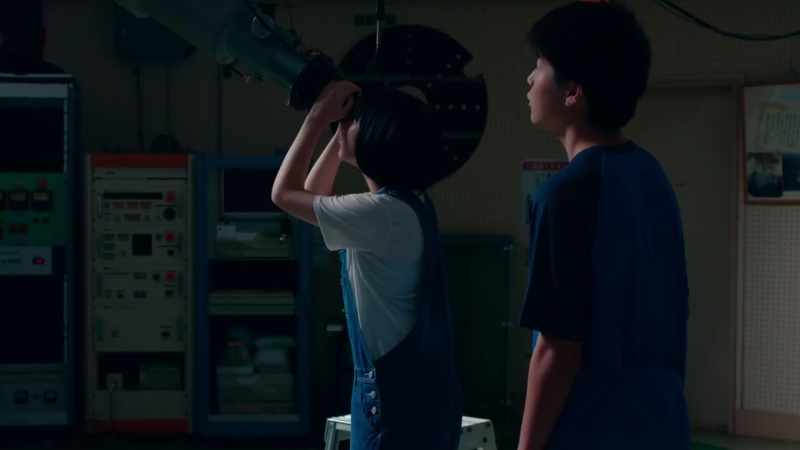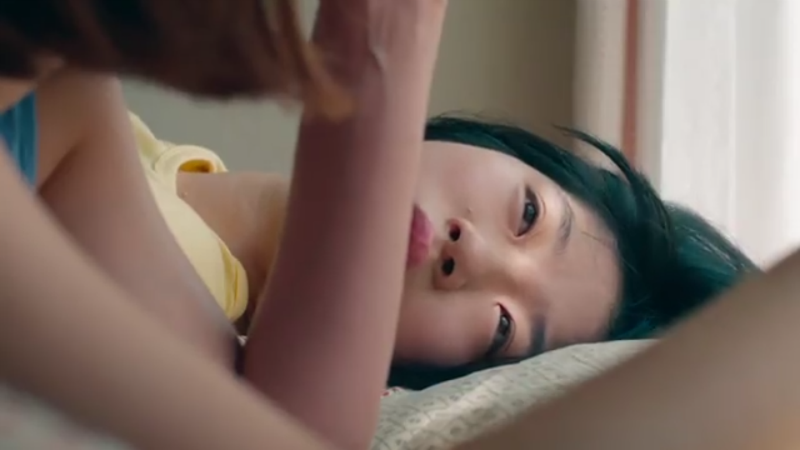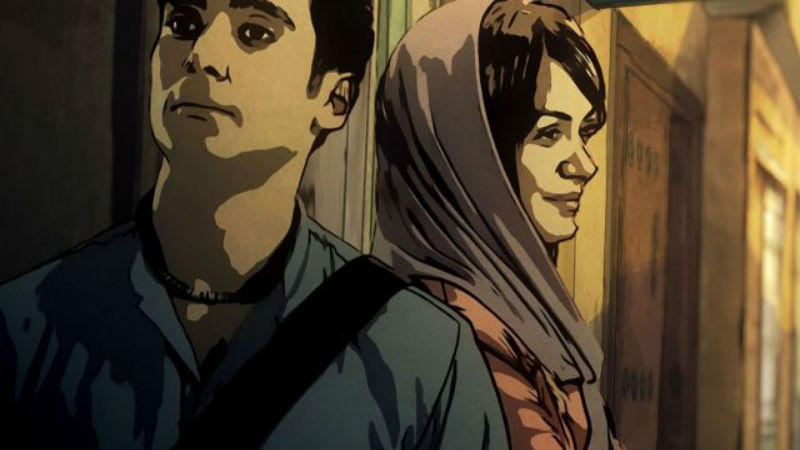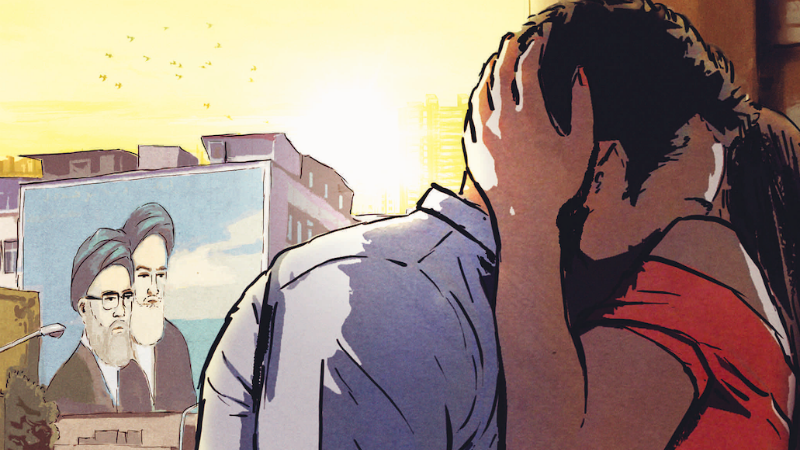QUICK SNAP: LIVE FROM TALLINN
This opens with a shot of a painting depicting a pig, a fire, an orgasmically ecstatic, scantily clad woman and more, elements which play a part in what follows.
In a smart, up-market apartment, a beautiful young prostitute (Wang Yun-zhi) meditates. Then she services her clients (shown to a soft-core degree of explicit detail). She gets the job done, but the men she services don’t seem to understand that sex is about two people, not just one person (them), so she endures it as a not especially enjoyable job rather than takes pleasure in it. She has a little grille in her door so she can see who’s there before she opens it.
Meanwhile, a young man (Yusuke Fukichi) rides a scooter through the streets, arrives at the building in the pouring rain, walks along the corridor. He’s delivering food to her apartment. His job done, he returns to his home. Home is a loose term; he’s technically homeless: he occupies a room in an abandoned section of a building with no fixtures and fittings, a basic, concrete shell. Some of the window panes are missing and the polythene sheeting covering them is attached, but torn in a few places and blowing uselessly in the high wind. He sleeps in a makeshift bed made from cardboard boxes.
The above two sequences are intercut, so that the footage constantly moves from one life to the other. The festival catalogue compared this to the films of both Wong Kar-wai and Kim Ki-duk. The former you could make a case for, but where Wong’s international crossover success Chungking Express (1994) revitalised cinema in both Hong Kong and beyond, the same can’t be said of the current film: its subject matter feels like we’ve seen it before. Both films, it’s true, deal with urban lives bumping in to one another, but Wong’s film was a game changer in a way that Wang’s current one is not. The Kim Ki-duk comparison is more apt, so we’ll return to that in due course.
In true, clichéd, tart-with-a-heart fashion, the whore opens her door and her heart to the delivery boy. They have sex and she enjoys it, the first time we’ve seen her take such enjoyment. During and after coitus, he is smitten with what can only be described as grief, first silently and then sobbing out loud. In a long, static and post-coital shot, she first (to my inevitably male gaze) tenderly touches and holds his hand, then enfolds him in her arms. (It would be interesting to see what a female writer would have made of this film: likely as not, she would have come down on it like a ton of bricks.)
As he’s leaving, they negotiate a deal down to 15 from 20 takeaways as the price for the evening. So he comes back, merely to deliver food, another 15 times. (This too recalls Chungking Express, with its narrative of stockpiling out-of-date cans of tinned fruit day by day only to later binge eat them all in one go.) Then, one day he comes back to find a real estate agent showing a well-heeled couple round the cleared apartment.
Before that though, on the back of the first night, the delivery boy takes the prostitute out for a romantic evening at a restaurant and they both have a really good time, with no attached obligation for coitus. He confesses to her his dream of starting his own food stall, and when he’s subsequently got it going, she comes down to visit him. On a later occasion still, she discovers that she is pregnant. And vanishes from the narrative.
Meanwhile, the delivery boy has been slowly finding the occasional piece of furniture for his makeshift home, transporting a cupboard from a building’s rubbish deposit point on his bike then up the stairs by hand to where he’s living. Here he runs into a lady Filipino resident (Jan Hui-ling) who appears to have a bona fide apartment in which she stores goods as if it were a small warehouse and has a fridge packed full with large, solid cuts of meat.
She takes pity on him, rescuing a blanket and taking it up to his place. After the young prostitute disappears from his life, this older woman comes and lies beside him, caressing his side tenderly, but he’s not interested and does not reciprocate.
Instead she must make do with the sleazy, local building superintendent (Jason King Jiah-wen) constantly coming on to her and soon forcing himself on her. It’s unclear to what extent this is consensual and to what extent she enjoys it – somewhere between the two. Some script ideas there (and you can write a script in pictures and or sounds, no-one’s suggesting it has to be dialogue) in need of clarity. Judging by Nina Wu (Midi Z, 2019), Taiwan has been as affected by the #metoo movement as much as anywhere else, so there’s really no excuse for such woolly portrayals of female sexuality.
This is as good a moment as any to invoke the spirit of the late Kim Ki-duk, the bad boy of Korean cinema whose final film Call Of God (2022) is also in the 26th Tallinn Black Nights Film Festival, and who often plays around with notions like this. However, I would argue Kim does so as a deliberate provocateur who has thought things through and, however unpalatable others might find his conclusions, run with them.
In The Morning Of La Petite Mort goes on to further episodes after the prostitute has vanished, in which the delivery boy works at a chicken farm and one night has a crash which leaves him half-blinded and covered with burn scars. The prostitute, meanwhile, comes back into her own strand of the narrative as a mother (now played by Ivy Yin Shin), with one terrific scene where she has sex with a client (Cres Chuang), doing everything for him while he does nothing for her, while she rocks her baby’s hammock style cradle with her foot, a scene and an image worthy of Kim Ki-duk. In another tremendous scene towards the end she discovers the former delivery boy, now scarred with burns, confined to a wheelchair and reduced to selling food from a tray and she buys him a meal from a stall to feed him, her young daughter also at the table, like an archetypal nuclear family. In an echo of earlier, she caresses his forehead and he, now barely able to see, breaks down in grief.
The film may have its shortcomings, however the deft way it juggles the lives of its various protagonists makes it worth a look. A handful of scenes are quite outstanding.
In The Morning Of La Petite Mort premieres in the 26th Tallinn Black Nights Film Festival.












